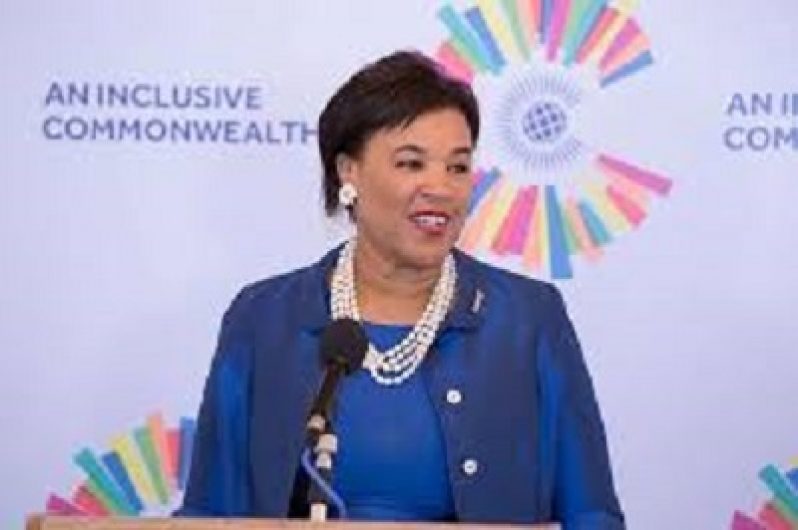LONDON, Sept 2, CMC – Commonwealth Secretary-General, Patricia Scotland, Monday, linked climate change to the “increasing frequency and intensity of these natural disasters,” as she expressed concern for The Bahamas as the “catastrophic” Hurricane Dorian continues to batter the Caribbean country.
“Memories of similar disastrous impacts in other Commonwealth countries caused by floods in Asia, by cyclones in Africa and the Pacific, and by hurricanes in the Caribbean, are still fresh in my mind,” the Dominican-born Secretary-General said.
“Nations are rebuilding from those climate disasters. We share with the people of The Bahamas deep concern about the impact of Hurricane Dorian on vulnerable communities and for economic resilience. “We will carry forward with renewed vigour our Commonwealth advocacy and work in support of small and vulnerable countries facing the serious challenge of climate change – an undoubted cause of the increasing frequency and intensity of these natural disasters,” she said in a statement.
Dorian, a Category 5 hurricane, considered one of the worst storms in recent history, has been battering the archipelago since Sunday. While there has been no official statement regarding casualties as yet, Bahamas Foreign Affairs Minister, Darren Henfield, has described the damage caused by a virtually stand-still Hurricane Dorian on the Abacos “as tremendous…the kind of which we have never seen”.
Henfield, who is the Member of Parliament for North Abaco, said in a message aired on ZNS News that residents of the area “are coming out of the last of the storm at the moment. “We have severe damage, compromise to buildings and homes. We are holding strong. We have no real communication right now because all of the networks are down,” he said, adding “we are moving about right now, we are basically in search and recover mode.
“We received catastrophic damage here and in Abaco,” he added.
In its latest bulletin, the Miami-based National Hurricane Centre (NHC) said that the Grand Bahamas Islands will continue to “experience catastrophic winds and storm surge” as Hurricane Dorian “inches westward” with sustained maximum winds of 155 miles per hour (mph). The storm is now 30 miles north east of Freeport, Grand Bahama and is moving “very slowly” towards the west at one mile per hour (mph). “A slow westward to west-northwestward motion is forecast during the next day or so, followed by a gradual turn toward the northwest and north. On this track, the core of extremely dangerous Hurricane Dorian will continue to pound Grand Bahama Island through much of today and tonight. “The hurricane will then move dangerously close to the Florida east coast late tonight through Wednesday evening and then move dangerously close to the Georgia and South Carolina coasts on Wednesday night and Thursday,” the NHC added.
In her statement, the Commonwealth Secretary-General said that she wanted “the government and all Bahamians to know that our thoughts and prayers are with them; and that we are working with our partners to make available as swiftly as possible whatever assistance The Bahamas may require at this time of great need and uncertainty. “It is heartrending to hear of the destruction and disruption this extremely powerful Atlantic hurricane has caused, forcing people out of their homes and wreaking widespread devastation on The Bahamas”
She said that among innovations being delivered by the Commonwealth Secretariat on behalf of its member countries is the Disaster Risk Finance Portal, designed to assist capacity-constrained governments with access to information on various finance instruments so that they are better equipped to manage the financial impact of natural disasters. “Alongside this there are programmes such as our Commonwealth Climate Finance Access Hub, which has helped countries gain access to US$25 million for climate action, with a further US$367 million in the pipeline;”.
She said the Commonwealth’s participation in CommonSensing, a consortium of international partners, working together to support and build climate resilience and enhance decision-making through the use of satellite remote sensing technology, is also being pursed. “Every time a member country is affected, the urgency and resolve with which we need to mobilise our Commonwealth response is borne in afresh on our collective consciousness.”



.jpg)








